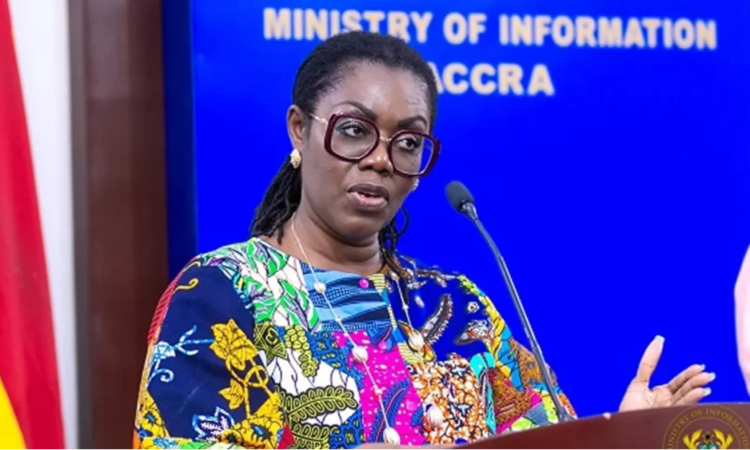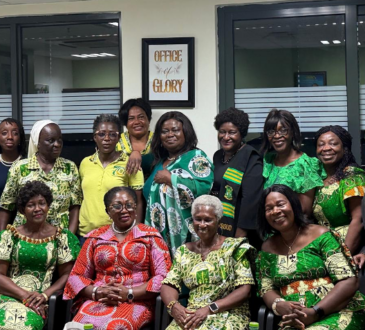
The Next-Gen InfraCo (NGIC) wholesale 5G service is expected to be launched in the last quarter of this year, the Minister of Communications and Digitalisation, Ursula Owusu-Ekuful has announced.
This initiative aims to deliver affordable 5G mobile broadband services across the nation, propelling the populace towards a fully digitized Ghana by 2030.
Delivering a statement at a press conference in Accra on Thursday, the Minister indicated that the company plans to deploy 4,400 sites, aiming to reach 37 million end customers by 2028, with the goal of making Ghana 100% digital by 2030.
NGIC’s wholesale 5G service is expected to be launched in the last quarter of this year. The company plans to deploy 4,400 sites, aiming to reach 37 million end customers by 2028, with the goal of making Ghana 100% digital by 2030. Ghana has a mobile penetration rate of
115%, with an average monthly data usage expected to rise from 1.9 GB to 20 GB by 2028.
The Government of Ghana, in collaboration with Ascend Digital, K-NET, Radisys, Nokia, and Tech Mahindra, supported by All Mobile Network Operators in Ghana, starting with AT and Telecel, has launched the Next-Gen InfraCo (NGIC).
The Next-Gen InfraCo (NGIC) is a new shared infrastructure company, co-promoted by the Government of Ghana, Ascend Digital, and K-NET.
This partnership includes leading technology providers Nokia, Radisys and Tech Mahindra.
Further, the Minister revealed that discussions will soon be finalised with Microsoft, which has expressed an interest in the project. NGIC’s equity will be held by the Republic of Ghana, Ascend Digital, K-NET, all Mobile Network Operators in Ghana and other investors, including the technology providers who may wish to join the consortium.
NGIC has been awarded a 5G license and is expected to launch 5G services across Ghana within the next six months, with plans for future expansion into other parts of Africa.
The shared 4G and 5G infrastructure will be built by Nokia and Radisys, with IT architecture and integration provided by Microsoft and Tech Mahindra. This collaboration ensures that the country leverages cutting-edge world-class expertise and technology to build a robust digital infrastructure.
“NGIC will enable a “reset” of Ghana’s economy by attracting investments across all sectors and providing access to all manner of e- services and improve the quality of life for all Ghanaians by ensuring that everyone, regardless of their location, has access to the latest digital services.” She said.
Efforts towards a 100% digital Ghana include rehabilitating critical national infrastructure such as the eastern corridor fibre, the national data centre, and LTE FWA, building a rural telephony network connecting 3.4 million subscribers in rural communities, establishing the Cybersecurity Authority and resourcing the Data Protection Commission, among other initiatives, all aimed at providing a resilient framework for digitalisation. These efforts have already shown significant positive impacts on communities, the Minister noted.
Despite launching 4G in Ghana 9 years ago, the current 4G penetration rate is 15%, with the majority of the population using 3G networks.
Through NGIC, “we hope to increase the 4G penetration rate to 80% and beyond nationwide, with a total deployment of 3,200 and 1,200 4G and 5G sites, respectively, rolled out in the next 3 years.
The existing 1,000 plus 4G-ready towers built by the Rural Telephony Project, have significantly impacted 4G adoption in rural areas. NGIC expects to expand 4G services and enhance coverage in underserved areas to ensure that even the most remote communities have access to high-speed internet and the benefits it brings.” the Communications Minister added.
As the sole wholesale 5G licensee in Ghana, NGIC will offer an open access-based neutral platform to all MNOs and collaborate with all tower companies in the country.
AT and Telecel Ghana have already signed partnership agreements with NGIC. Discussions with MTN, the Minister said will begin shortly and they are also expected to sign on. This inclusive approach ensures that all service providers have equal access to the infrastructure needed to deliver high-quality services to their customers.
All MNOs and ISPs are part of this venture and have been invited to invest in the project. We believe it even has the potential to attract renowned MVNOs to consider operating in Ghana, providing more choices to consumers.
The initial focus is on building a scalable shared infrastructure in Ghana, with the potential to expand to other parts of Africa. NGIC may seek additional funding through capital markets to support future scaling. NGIC aims to be the first 5G Mobile Broadband Shared Infrastructure Entity to build a nationwide 4G/5G network. The company plans to launch affordable 4G/5Genabled Fixed Wireless Access (FWA) CPEs and smartphones within this calendar year.
By Eugene Davis







